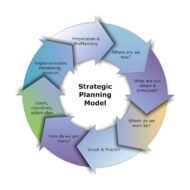Posted by Managementguru in Business Management, Decision Making, Marketing, Organisational behaviour, Principles of Management, Strategy
on Mar 23rd, 2014 | 0 comments

Smart Objectives for Success An objective describes something which has to be accomplished and defines what organizations, functions, departments, teams and individuals are expected to achieve. Objectives may be operational or developmental. When the contribution is oriented towards the accomplishment of corporate objectives, in the light of the organization’s mission, core values and strategic plans, it is termed as operational; personal or learning objectives that involve the improvement of knowledge, skills and performance of individuals is termed as developmental. Objectives must be SMART: S-scientific M-motivating A-achievable R-realistic T-time bound Objectives that are mostly confined to the near future may be termed-short term objectives, which are accomplished in the stipulated time duration. Say, for example, 1000 units of pet bottles have to be produced in a week’s time. If the firm is focused on the overall production plan for the forthcoming year, then it is termed as long term objective. In a production environment, a firm has to initially go for an aggregate plan, where the production capacity of the plant is determined to make the project feasible. The firm has to make doubly sure, whether it is resourceful in terms of physical, financial and human aspects. The work centers are allotted with jobs in a mock trial to check man versus machine co-ordination and compatibility. Pic Courtesy: Digital Information World Proper Planning: Objectives are achieved only when there is proper planning. The top management must take the pains to clearly explain the objectives to all the employees across different levels of organization to facilitate smooth functioning. When the employees understand what is expected of them, the performance gets oriented towards accomplishing the objectives; the employees get proper direction and focus. Delivering Happiness: A Path to Profits, Passion, and Purpose Think of this, what will happen to the sales volume, if the marketing manager does not properly educate his team about the targets to be achieved for that quarter? Definitely there will be a dip in the sales owing to the lethargic and irresponsible attitude of the manager. Ultimately, the organization stands to suffer a loss in terms of time and cost of recruiting a new person to head the marketing department. Right Person for the Right Job: Organizations have to be meticulous while choosing people for the post of managers. The chosen persons must be able to identify themselves with the organization and its objectives, so that they could be a source of inspiration for people down the line. Right people for the right job, at the right place and right time is the success mantra. Objectives have to be periodically revised in the light of changing economic, political and technological developments. How to Stop Worrying and Start Living If not the objectives might become obsolete and in due course you will get stranded amidst the roaring competition. The process of business management aims at managing people and other resources to make a modest profit. How to achieve success in an open market? By clearly setting objectives that serve as tools of motivation and persuasion, a firm can evolve and contribute strategic inputs that make the objectives realistic and...

Posted by Managementguru in Business Management, Decision Making, Organisational behaviour, Principles of Management, Strategy
on Mar 23rd, 2014 | 0 comments

Strategic Evaluation: concerns mainly the analysis and judgment of interventions at the level of strategic goals. One of the noteworthy aspects of strategic evaluation consists of the verification of the adopted strategy with respect to the current and likely social and economic situation. How a firm has performed over time and relatively to its competitors, can be determined with the help of the following quantitative measures. Market price of the sharesMarket shareEarnings on capital employedDividend ratesReturn on equityGrowth in sales volumeProduction costs and efficiencyDistribution costs and efficiencyEmployee turnover, absenteeism, and satisfaction indices. Since there is a high correlation between progress and these indicators, we can say that a firm is successful if majority of the factors show a positive signal. But in reality, one cannot expect a business firm to satisfy all the above mentioned criteria, as performance is also affected by unexpected variations in the external environment. One has to trade-off between the positive and negative indicators and find suitable ways to enhance the performance levels. Effectiveness of a Strategy: The strategic importance of any particular criterion may not remain the same at different points of time. The short run and long run effectiveness of strategy cannot be evaluated using the same criteria. There may be difficulties in computation and different methods of computation that may be encountered in measurement. These factors serve as the bases for firms to identify the elements of success. Yet another way of performance evaluation is to identify critical factors that may be regarded as symptoms of decline and can be treated as early warning signals during the implementation of strategy. If they indicate the necessity of a turnaround or retrenchment strategy, the firm should definitely go for a suitable action without further delay. Such factors may be: Declining profit marginDeclining market shareRapidly increasing debtDeclining working capitalIncreasing managerial turnover What is the Need for Strategic Evaluation? You might be curious to know, what is the need for a strategic evaluation at all in the first instance? See, business firms and corporate companies are always in a position to execute their action plans in the wake of severe competition and retention of market share. A plan without a strategy is like life without a soul and decision making is solely dependent upon strategic inputs. Turnaround Strategy The need for feedback, appraisal and reward, check on the validity of strategic choice congruence between decisions and intended strategy all these help in successful culmination of strategic management process and create inputs for new strategic planning. What’s the difference between Strategy and Tactic? The evaluation need not be based only on quantitative terms, but also on qualitative aspects such as: internal consistency, consistency with the environment, appropriateness of the strategy in the light of available resources, acceptability of the degree of risk involved in the strategy, appropriateness of the time horizon of the strategy...




